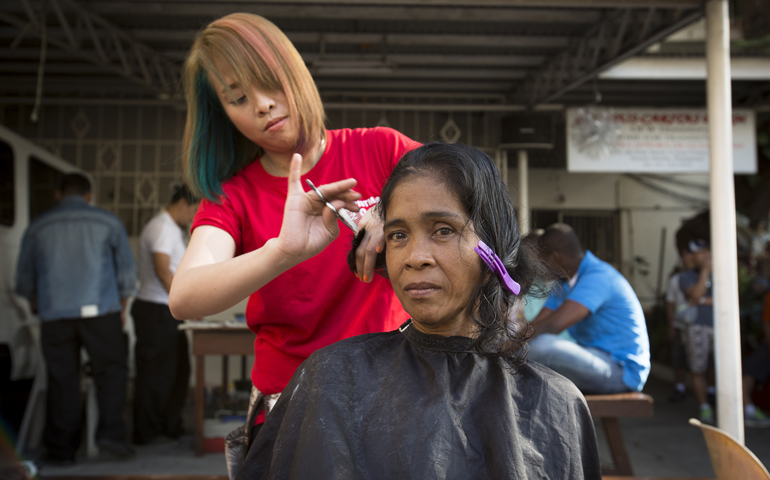
A volunteer cuts the hair of a homeless woman at a church in Manila, Philippines, Jan. 9. (CNS/Tyler Orsburn)
Pope Francis returns to Asia this week, where crises are priming the ground for the kind of church he is working to grow.
“Francis’ dream of a church that is bruised and wounded and muddied is what the church in Asia wishes to be,” said Cardinal Orlando Quevedo of Cotabato, Philippines, who for years led the Federation of Asian Bishops’ Conferences, or FABC, and who was named a cardinal by Pope Francis last year.
Quevedo says Francis understands Asians because “the vision of church in Asia is the vision of Francis -- a church of the poor and a church that is in dialogue.”
He said what seems to be “just a footnote in Western theology” is “very strong” in Asian, African and South American theology because of the situation of poverty.
The cardinal said the pope’s vision placed all these elements at the center of the doctrine of the church rooted in Christian identity and in the beginning of Christianity: “Jesus who was poor, Jesus who called the poor as his disciples, Jesus who said the first beatitude is ‘blessed are the poor,’ Jesus who lived and walked with the poor.”
Francis placed what others in the church regard as “just liberation theology” on to center stage in his apostolic exhortation, Evangelii Gaudium, Quevedo told NCR shortly before Francis left the Vatican for Asia.
Francis’ first stop is Sri Lanka, where a five-day old government will greet him. Whirlwind elections had just unseated President Mahinda Rajapaksa and voted in Maithripala Sirisena.
In a surprise move, the Rajapaksa government called the elections two years early, which worried Sri Lankan Catholics long active in human rights work, like Holy Family of Bordeaux Sr. Deepa Fernando.
“We, the Christian Solidarity Movement, had doubts about the visit of our pope and sent letters to stop him from coming to Sri Lanka because we felt that the government was planning to use his visit for their political propaganda,” she said.
But worry changed to relief, said Fernando, who spent Thursday as an election monitor in the western province, which is dominated by the ethnic Sinhalese majority.
With a “peaceful” post-election environment, “everything is ready for the pope’s coming,” Fernando said, citing the new president’s announcement that “the government is ready to welcome His Holiness.”
The theme of the trip to Sri Lanka is “Abide in Love.” The pope will canonize the country’s first saint, Blessed Joseph Vaz, a 17th-century priest who acted as a slave to bring the Gospel to the people during times of persecution. Francis will pray with pilgrims at the popular shrine of Our Lady of Madhu in Mannar, a northern Sri Lanka district heavily affected by the civil war in which Christians fought on both sides.
Cardinal Malcolm Ranjith of Colombo told Vatican Radio that a papal visit just as a new administration is beginning offers opportunity for the pope to push the government to work for reconciliation between the Tamil ethnic minority and the ethnic majority Sinhalese people.
Quevedo told NCR in Manila that he sees Francis’ desire to be with the Tamil people, who have endured government oppression, as “a way of showing his preferential option for the poor who are in the north.”
The pope is going to a section of the country where many Catholics and Christians live and aspire for independence and self-determination, Quevedo said. He recalled Francis’ World Day of Peace message, which speaks about the aspirations of minorities.
“The fact that [Francis] insisted on visiting the north, where people have been crying out about human rights violations, is a message in itself,” Quevedo said. To the cardinal, it shows the pope wants to speak with those who fought for human rights.
“Who knows? He might say something about the rights of minorities and the poor people,” Quevedo added.
He said he believes Francis in his pastoral visit to the Philippines, where nearly a quarter of the 92 million people live in poverty, will also emphasize dialogue with the poor, intercultural dialogue and interreligious dialogue.
“In the instructions [preparing for the trip], [Francis] wants to meet the poor in Manila and to meet the poor and suffering in Tacloban,” part of the central Philippines devastated by a super typhoon just a little more than a year ago, Quevedo said.
The pope is expected to arrive in Manila from Sri Lanka on Thursday. His five-day pastoral visit with the theme “mercy and compassion” will take him to Tacloban City on Saturday, where most of the more than 6,000 deaths and most of the destruction of property during the 2013 super Typhoon Haiyan were recorded.
Denis Murphy of Urban Poor Associates, or UPA, said Francis is visiting Tacloban just as the United Nations and their associate agencies are completing their yearlong assistance program. Survivors are left to complete rehabilitation and rebuilding efforts with government agencies, nongovernmental organizations, and other organizations.
UPA partners with the Missionary Sisters of the Holy Spirit on community organizing work in 10 Tacloban communities. It also supports feeding programs, helps communities search for funds for housing materials, collaborates with catechists, trains residents to deal with the government and other people, and implement emergency action during typhoons.
Residents and UPA workers expect getting close to Francis in Tacloban’s tight venue and roads to be tough and have compiled messages telling the pope their thoughts and feelings on church matters and handed them to Archbishop John Du of Palo, Leyte.
Cardinal Luis Antonio Tagle in a Jan. 10 forum on Francis’ visit to Manila could not confirm speculations that the pope would issue his much-anticipated encyclical on the environment in the typhoon-ravaged city.
“The project to have an encyclical by the pope on the environment is true because I have heard about it from some people in the Vatican who are helping him in drafting the document,” Tagle said. But he said he has also heard it won’t be ready soon. The Vatican has said the encyclical won’t be ready for some time.
“I cannot tell you whether that document is already prepared or ready for promulgation,” Tagle said. “If it happens in Tacloban -- wow!”
The cardinal pointed out that Francis’ Evangelii Gaudium quoted the 1988 Catholic Bishops’ Conference of the Philippines pastoral letter on ecology, “What is Happening to our Beautiful Land?”
The themes and concerns would be familiar to nine bishops of FABC who have been delegated to join the pope’s pastoral visits:
- Cardinal Oswald Gracias of Mumbai, India, FABC president
- newly designated Myanmar Cardinal Charles Bo of Yangon
- Archbishop Paul Bui Van Doc of Ho Chi Minh City, Vietnam
- Filipino Bishop Wenceslao Padilla of Ulaanbaatar in Mongolia
- Indonesian Archbishop Ignatius Suharyo Hardjoatmodjo of Jakarta
- Bishop Louis-Marie Ling Mangkhanekhoun of Pakse, Laos
- East Timor Bishop Basílio Do Nascimento of Baucau
- Kazakhstan Archbishop Tomash Peta of Astana
- Cardinal John Tong Hon of Hong Kong
FABC Secretary General Fr. Raymond O’Toole told NCR the FABC delegates will travel with Archbishop Bernardito Auza, the Holy See’s Permanent Observer to the United Nations, who comes from the Philippines earthquake-ravaged Bohol province.
While there is no special role for the Asian bishops listed in papal visit programs, Quevedo said he expects their encounter with Francis will “have [a] big impact” on other churches in the region.
[N.J. Viehland is NCR’s Manila correspondent. Follow her on Twitter @njviehland.]
